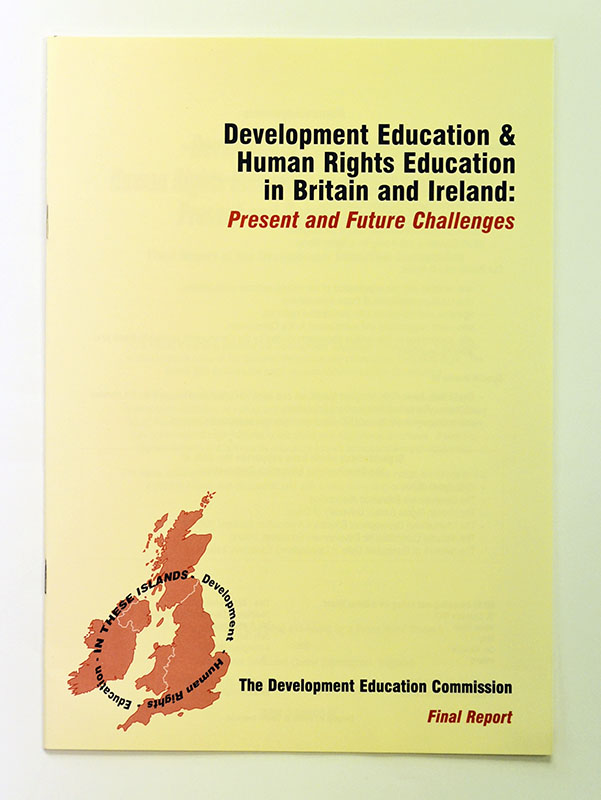The Development Education Commission was conceived and designed to influence policy and practice in development education in Britain and Ireland. It arose from the need and desire to clarify the nature and specificity of DE and to describe its key characteristics. The Commission began its work in 1996 and published its overall report in 1999.
Who we are
The Commission comprised the following members:
Kevin Boyle (Chair) Professor of law and Director of the Human Rights Centre, University of Essex; Mary Banotti (MEP); Ian Barr (Scottish Consultative Committee on the Curriculum, Scotland); Doug Bourn (DEA, UK); Lalage Bown (Emeritus Professor, university of Glasgow); Tim Brighouse (Chief Education Officer, Birmingham); Margot Brown (Centre for Global Education, York); Rita Chowdhury and Roland Clark (Development Education Centre, Birmingham); Catherine coxhead Former Chief Executive, CCEA, Northern Ireland); Peader Cremin (Mary Immaculate College, Limerick and 80:20); Anne Dolan (University College Galway); Eleri Elliott (former Assistant Principal, Normal College, Wales); Mari Fitzduff (University of Ulster); John Huckle (South Bank university); Joe Joseph (DeMontford university); Glenys Kinnock (MEP); Penny Lawrence (VSO); Bhiku Parekh (University of Hull); Saba Risaluddin (Calamus Foundation, London); Anton trant (former Director, CDVEC Curriculum Development unit, Dublin); Liam Wegimont (Development Education for Youth, Ireland)
What we did
The project was conceived and designed to influence policy and practice in development education in Britain and Ireland. It arose from the need and desire to clarify the nature and specificity of DE and to describe its key characteristics.
The project was initiated by TIDE, Birmingham (Teachers in Development Education) and 80:20 Educating and Acting for a Better World, Ireland; it was formally supported by Cyfanfyd in Wales, the Development Education Association in the UK, the Human Rights Centre, University of Essex, IDEAS (International Development Education Association, Scotland, the national Committee for Development Education in Ireland and the Network of Curriculum Units in Development Education in Ireland.
The Commission was made up of 21 members from education institutions and structures as well as NGOs from England, Scotland, Wales, Northern Ireland and Ireland. The Commission was chaired by Professor Kevin Boyle of Essex and published 3 core documents including a final report Essential learning for Everyone; civil society, world citizenship and the role of education (1999). Additionally, it published two discussion papers exploring What is Development by professor Lalage Bown (1999) and What are human Rights by Omar Grech of the University of Malta.
3 big ideas:
- Development and Human Rights Education is a formal part of all curricula across both islands (and internationally) in the context of both non-formal and formal education systems and yet, it remains insufficiently articulated and supported
- DE and HRE have much to contribute to education generally in the context of increased globalisation and its challenges to citizenship and empowerment
- There exists very considerable interest in and engagement with educational responses to issues of justice, development and equality (especially amongst young people) and we need to build systematically and strategically on this ‘disposition’ towards change
How we did it
The following were the core components of the project:
- The convening of a series of meetings of members of the Commission in each of the countries involved.
- The holding of a series of consultation meetings across both islands based on a consultative document published in 1998
- The preparation of a subsequent report published in 1999
- Preparation, publication and dissemination of a final commission Report Essential Learning in 1999
- A series of follow-up meetings involving members of the Commission with educational structures and institutions across both islands
Did we succeed
The overall final report of the Commission outlined an ‘essential core’ which should underpin both Human Rights Education and Development Education and related areas such as Peace education, Multicultural Education, Environmental Education, Anti-Racist Education and Gender Education.

This ‘essential core’ comprised four key components:
- Dispositions and Values (respect for self; respect for others; a sense of social responsibility, a sense of belonging, a commitment to learning and an engagement with change
- Capabilities and Skills (communication skills, critical reasoning and thinking skills, social skills and action skills)
- Ideas and Understandings (the centrality of relationships, the disparity in human living conditions, the importance of technological and economic change, the concepts of democracy, governance and citizenship; cultural identities, conflict and conciliation, rules, rights and responsibilities, gender identities and sustainable development and conservation
- Experiences and Actions (working independently and cooperatively, giving and receiving feedback, feeling valued, sharing responsibility, knowing a sense of achievement and making connections).
The work of the Commission brought together, for the first time, a significant group of educationalists and activists to share their diverse and varied experiences and perspectives. It was clear from the outset that this exercise had considerable impact on the thinking of the members and the organisations and structures they represented. All members were influential in their own spheres and brought the learning of the Commission to bear in these contexts.
The reports produced by the Commission were welcomed broadly but subsequent changes in curricula and funding for DE and Human Rights Education and in the policy priorities of governments and aid structures redirected much of the focus and energy of both areas thereby lessening the impact of the Commission.
There remains a resistance to learning from each other and each jurisdiction (and its structures and networks) continue to pursue independent and ‘separate’ agendas and strategies.
